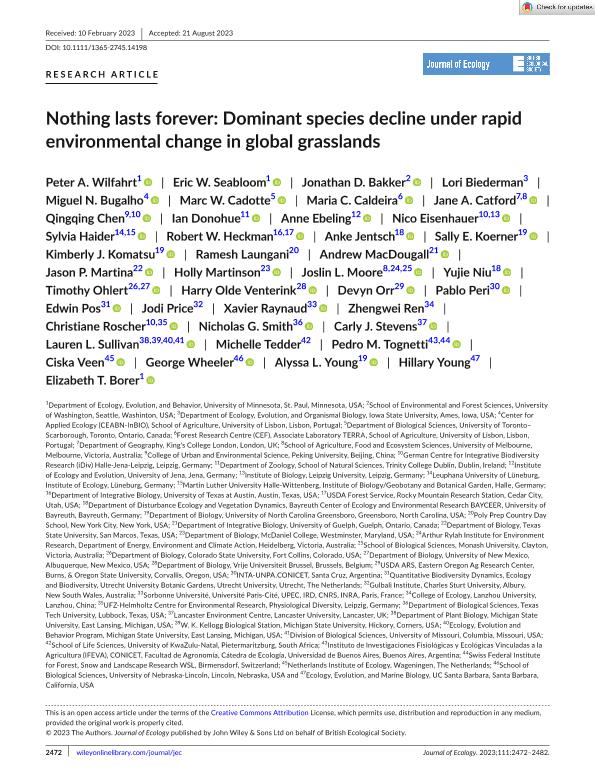Mostrar el registro sencillo del ítem
dc.contributor.author
Wilfahrt, Peter A.
dc.contributor.author
Seabloom, Eric

dc.contributor.author
Bakker, Jonathan

dc.contributor.author
Biederman, Lori
dc.contributor.author
Bugalho, Miguel N.
dc.contributor.author
Cadotte, Marc W.

dc.contributor.author
Caldeira, Maria C.

dc.contributor.author
Catford, Jane A.
dc.contributor.author
Chen, Qingqing
dc.contributor.author
Donohue, Ian
dc.contributor.author
Ebeling, Anne
dc.contributor.author
Eisenhauer, Nico

dc.contributor.author
Haider, Sylvia
dc.contributor.author
Heckman, Robert W.
dc.contributor.author
Jentsch, Anke
dc.contributor.author
Koerner, Sally E.
dc.contributor.author
Komatsu, Kimberly J.

dc.contributor.author
Laungani, Ramesh
dc.contributor.author
MacDougall, Andrew
dc.contributor.author
Smith, Nicholas G.
dc.contributor.author
Stevens, Carly J.
dc.contributor.author
Sullivan, Lauren L.
dc.contributor.author
Tedder, Michelle
dc.contributor.author
Peri, Pablo Luis

dc.contributor.author
Tognetti, Pedro Maximiliano

dc.contributor.author
Veen, Ciska
dc.contributor.author
Wheeler, George
dc.contributor.author
Young, Alyssa L.
dc.contributor.author
Young, Hillary
dc.contributor.author
Borer, Elizabeth

dc.date.available
2023-12-20T13:29:54Z
dc.date.issued
2023-11
dc.identifier.citation
Wilfahrt, Peter A.; Seabloom, Eric; Bakker, Jonathan; Biederman, Lori; Bugalho, Miguel N.; et al.; Nothing lasts forever: Dominant species decline under rapid environmental change in global grasslands; Wiley Blackwell Publishing, Inc; Journal of Ecology; 111; 11; 11-2023; 2472-2482
dc.identifier.issn
0022-0477
dc.identifier.uri
http://hdl.handle.net/11336/220891
dc.description.abstract
Dominance often indicates one or a few species being best suited for resource capture and retention in a given environment. Press perturbations that change availability of limiting resources can restructure competitive hierarchies, allowing new species to capture or retain resources and leaving once dominant species fated to decline. However, dominant species may maintain high abundances even when their new environments no longer favour them due to stochastic processes associated with their high abundance, impeding deterministic processes that would otherwise diminish them. Here, we quantify the persistence of dominance by tracking the rate of decline in dominant species at 90 globally distributed grassland sites under experimentally elevated soil nutrient supply and reduced vertebrate consumer pressure. We found that chronic experimental nutrient addition and vertebrate exclusion caused certain subsets of species to lose dominance more quickly than in control plots. In control plots, perennial species and species with high initial cover maintained dominance for longer than annual species and those with low initial cover respectively. In fertilized plots, species with high initial cover maintained dominance at similar rates to control plots, while those with lower initial cover lost dominance even faster than similar species in controls. High initial cover increased the estimated time to dominance loss more strongly in plots with vertebrate exclosures than in controls. Vertebrate exclosures caused a slight decrease in the persistence of dominance for perennials, while fertilization brought perennials' rate of dominance loss in line with those of annuals. Annual species lost dominance at similar rates regardless of treatments. Synthesis. Collectively, these results point to a strong role of a species' historical abundance in maintaining dominance following environmental perturbations. Because dominant species play an outsized role in driving ecosystem processes, their ability to remain dominant—regardless of environmental conditions—is critical to anticipating expected rates of change in the structure and function of grasslands. Species that maintain dominance while no longer competitively favoured following press perturbations due to their historical abundances may result in community compositions that do not maximize resource capture, a key process of system responses to global change.
dc.format
application/pdf
dc.language.iso
eng
dc.publisher
Wiley Blackwell Publishing, Inc

dc.rights
info:eu-repo/semantics/openAccess
dc.rights.uri
https://creativecommons.org/licenses/by-nc-sa/2.5/ar/
dc.subject
DETERMINANTS OF PLANT COMMUNITY DIVERSITY AND STRUCTURE
dc.subject
DOMINANCE
dc.subject
FERTILIZATION
dc.subject
GLOBAL CHANGE ECOLOGY
dc.subject
HISTORICAL CONTIGENCY
dc.subject
PLANT POPULATION AND COMMUNITY DYNAMICS
dc.subject
PLANT–HERBIVORE INTERACTIONS
dc.subject.classification
Otras Agricultura, Silvicultura y Pesca

dc.subject.classification
Agricultura, Silvicultura y Pesca

dc.subject.classification
CIENCIAS AGRÍCOLAS

dc.title
Nothing lasts forever: Dominant species decline under rapid environmental change in global grasslands
dc.type
info:eu-repo/semantics/article
dc.type
info:ar-repo/semantics/artículo
dc.type
info:eu-repo/semantics/publishedVersion
dc.date.updated
2023-12-15T14:02:12Z
dc.journal.volume
111
dc.journal.number
11
dc.journal.pagination
2472-2482
dc.journal.pais
Reino Unido

dc.journal.ciudad
Londres
dc.description.fil
Fil: Wilfahrt, Peter A.. University of Minnesota; Estados Unidos
dc.description.fil
Fil: Seabloom, Eric. University of Minnesota; Estados Unidos
dc.description.fil
Fil: Bakker, Jonathan. University of Washington; Estados Unidos
dc.description.fil
Fil: Biederman, Lori. Iowa State University; Estados Unidos
dc.description.fil
Fil: Bugalho, Miguel N.. Universidade Nova de Lisboa; Portugal
dc.description.fil
Fil: Cadotte, Marc W.. University of Toronto–Scarborough; Estados Unidos
dc.description.fil
Fil: Caldeira, Maria C.. Universidade Nova de Lisboa; Portugal
dc.description.fil
Fil: Catford, Jane A.. University of Melbourne; Australia
dc.description.fil
Fil: Chen, Qingqing. Peking University; China. German Centre for Integrative Biodiversity Research; Alemania
dc.description.fil
Fil: Donohue, Ian. Trinity College Dublin; Irlanda
dc.description.fil
Fil: Ebeling, Anne. University of Jena; Alemania
dc.description.fil
Fil: Eisenhauer, Nico. German Centre for Integrative Biodiversity Research; Alemania. Leipzig University; Alemania
dc.description.fil
Fil: Haider, Sylvia. Martin Luther University Halle-Wittenberg; Alemania. Leuphana University of Lüneburg; Alemania
dc.description.fil
Fil: Heckman, Robert W.. University of Texas; Estados Unidos. United States Forest Service; Estados Unidos
dc.description.fil
Fil: Jentsch, Anke. University of Bayreuth; Alemania
dc.description.fil
Fil: Koerner, Sally E.. University of North Carolina Greensboro; Estados Unidos
dc.description.fil
Fil: Komatsu, Kimberly J.. University of North Carolina Greensboro; Estados Unidos
dc.description.fil
Fil: Laungani, Ramesh. Poly Prep Country Day School; Estados Unidos
dc.description.fil
Fil: MacDougall, Andrew. University of Guelph; Canadá
dc.description.fil
Fil: Smith, Nicholas G.. Texas Tech University; Estados Unidos
dc.description.fil
Fil: Stevens, Carly J.. Lancaster University; Reino Unido
dc.description.fil
Fil: Sullivan, Lauren L.. Michigan State University; Estados Unidos. Consejo Nacional de Investigaciones Científicas y Técnicas; Argentina
dc.description.fil
Fil: Tedder, Michelle. University of KwaZulu-Natal; Sudáfrica
dc.description.fil
Fil: Peri, Pablo Luis. Consejo Nacional de Investigaciones Científicas y Técnicas. Centro de Investigaciones y Transferencia de Santa Cruz. Universidad Tecnológica Nacional. Facultad Regional Santa Cruz. Centro de Investigaciones y Transferencia de Santa Cruz. Universidad Nacional de la Patagonia Austral. Centro de Investigaciones y Transferencia de Santa Cruz; Argentina
dc.description.fil
Fil: Tognetti, Pedro Maximiliano. Consejo Nacional de Investigaciones Científicas y Técnicas; Argentina
dc.description.fil
Fil: Veen, Ciska. Netherlands Institute of Ecology; Países Bajos
dc.description.fil
Fil: Wheeler, George. University of Nebraska-Lincoln; Estados Unidos
dc.description.fil
Fil: Young, Alyssa L.. University of North Carolina Greensboro; Estados Unidos
dc.description.fil
Fil: Young, Hillary. University of California; Estados Unidos
dc.description.fil
Fil: Borer, Elizabeth. University of Minnesota; Estados Unidos
dc.journal.title
Journal of Ecology

dc.relation.alternativeid
info:eu-repo/semantics/altIdentifier/doi/http://dx.doi.org/10.1111/1365-2745.14198
dc.relation.alternativeid
info:eu-repo/semantics/altIdentifier/url/https://besjournals.onlinelibrary.wiley.com/doi/10.1111/1365-2745.14198
Archivos asociados
